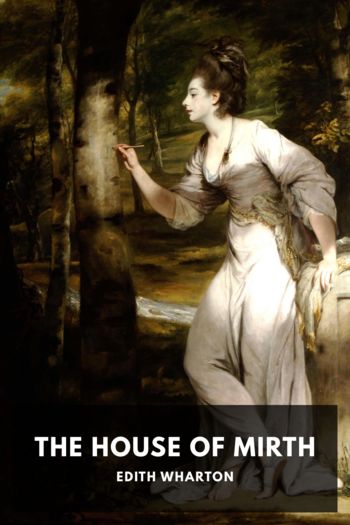The Age of Innocence by Edith Wharton (android based ebook reader .txt) 📕

- Author: Edith Wharton
Book online «The Age of Innocence by Edith Wharton (android based ebook reader .txt) 📕». Author Edith Wharton
“If you call it long! Isabel Chivers and Reggie were engaged for two years: Grace and Thorley for nearly a year and a half. Why aren’t we very well off as we are?”
It was the traditional maidenly interrogation, and he felt ashamed of himself for finding it singularly childish. No doubt she simply echoed what was said for her; but she was nearing her twenty-second birthday, and he wondered at what age “nice” women began to speak for themselves.
“Never, if we won’t let them, I suppose,” he mused, and recalled his mad outburst to Mr. Sillerton Jackson: “Women ought to be as free as we are—”
It would presently be his task to take the bandage from this young woman’s eyes, and bid her look forth on the world. But how many generations of the women who had gone to her making had descended bandaged to the family vault? He shivered a little, remembering some of the new ideas in his scientific books, and the much-cited instance of the Kentucky cave-fish, which had ceased to develop eyes because they had no use for them. What if, when he had bidden May Welland to open hers, they could only look out blankly at blankness?
“We might be much better off. We might be altogether together—we might travel.”
Her face lit up. “That would be lovely,” she owned: she would love to travel. But her mother would not understand their wanting to do things so differently.
“As if the mere ‘differently’ didn’t account for it!” the wooer insisted.
“Newland! You’re so original!” she exulted.
His heart sank, for he saw that he was saying all the things that young men in the same situation were expected to say, and that she was making the answers that instinct and tradition taught her to make—even to the point of calling him original.
“Original! We’re all as like each other as those dolls cut out of the same folded paper. We’re like patterns stencilled on a wall. Can’t you and I strike out for ourselves, May?”
He had stopped and faced her in the excitement of their discussion, and her eyes rested on him with a bright unclouded admiration.
“Mercy—shall we elope?” she laughed.
“If you would—”
“You do love me, Newland! I’m so happy.”
“But then—why not be happier?”
“We can’t behave like people in novels, though, can we?”
“Why not—why not—why not?”
She looked a little bored by his insistence. She knew very well that they couldn’t, but it was troublesome to have to produce a reason. “I’m not clever enough to argue with you. But that kind of thing is rather—vulgar, isn’t it?” she suggested, relieved to have hit on a word that would assuredly extinguish the whole subject.
“Are you so much afraid, then, of being vulgar?”
She was evidently staggered by this. “Of course I should hate it—so would you,” she rejoined, a trifle irritably.
He stood silent, beating his stick nervously against his boot-top; and feeling that she had indeed found the right way of closing the discussion, she went on light-heartedly: “Oh, did I tell you that I showed Ellen my ring? She thinks it the most beautiful setting she ever saw. There’s nothing like it in the rue de la Paix, she said. I do love you, Newland, for being so artistic!”
The next afternoon, as Archer, before dinner, sat smoking sullenly in his study, Janey wandered in on him. He had failed to stop at his club on the way up from the office where he exercised the profession of the law in the leisurely manner common to well-to-do New Yorkers of his class. He was out of spirits and slightly out of temper, and a haunting horror of doing the same thing every day at the same hour besieged his brain.
“Sameness—sameness!” he muttered, the word running through his head like a persecuting tune as he saw the familiar tall-hatted figures lounging behind the plate-glass; and because he usually dropped in at the club at that hour he had gone home instead. He knew not only what they were likely to be talking about, but the part each one would take in the discussion. The Duke of course would be their principal theme; though the appearance in Fifth Avenue of a golden-haired lady in a small canary-coloured brougham with a pair of black cobs (for which Beaufort was generally thought responsible) would also doubtless be thoroughly gone into. Such “women” (as they were called) were few in New York, those driving their own carriages still fewer, and the appearance of Miss Fanny Ring in Fifth Avenue at the fashionable hour had profoundly agitated society. Only the day before, her carriage had passed Mrs. Lovell Mingott’s, and the latter had instantly rung the little bell at her elbow and ordered the coachman to drive her home. “What if it had happened to Mrs. van der Luyden?” people asked each other with a shudder. Archer could hear Lawrence Lefferts, at that very hour, holding forth on the disintegration of society.
He raised his head irritably when his sister Janey entered, and then quickly bent over his book (Swinburne’s Chastelard—just out) as if he had not seen her. She glanced at the writing-table heaped with books, opened a volume of the Contes Drôlatiques, made a wry face over the archaic French, and sighed: “What learned things you read!”
“Well—?” he asked, as she hovered Cassandra-like before him.
“Mother’s very angry.”
“Angry? With whom? About what?”
“Miss Sophy Jackson has just been here. She brought word that her brother would come in after dinner: she couldn’t say very much, because he forbade





Comments (0)